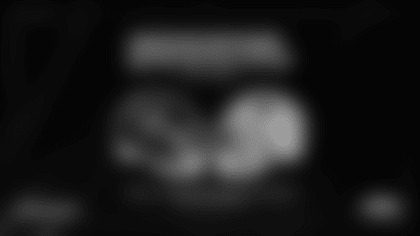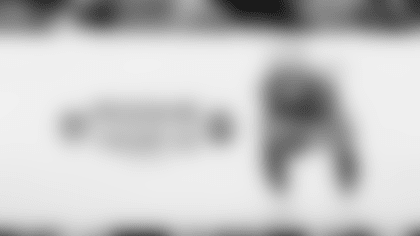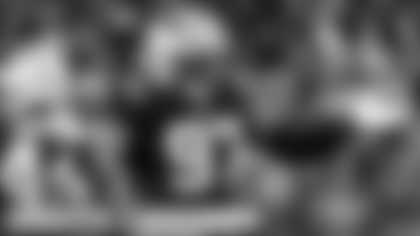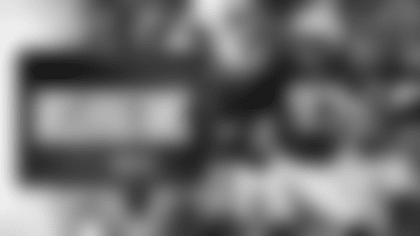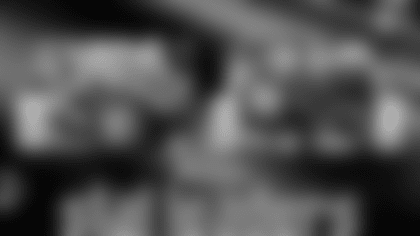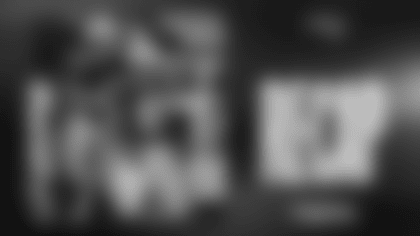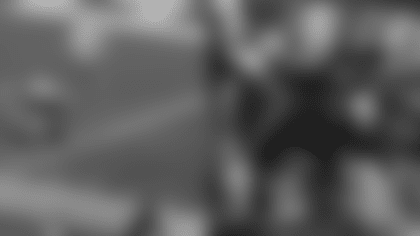[

]()
**B:** First I will comment on the roster move at the end of the day yesterday we put Andy (Katzenmoyer) on injured reserve. I spoke with Andy again this morning I think that he is in the process of making the decision as to what is the best way to treat his situation is and I would say that this condition he has got or whatever it is, is probably going to take several weeks to clear up. It doesn't look like he would be able to come back before the end of the season so that is why we put him on injured reserve. I wouldn't say that it is anything real serious or that would have any effect at all on next year, but at the present time it is bothersome enough where it is not making him as effective as he needs to be. Then we brought (Adrian) Klemm onto the 53-man active roster in Andy's spot. I think Adrian has continued to make good progress on the field and off the field in terms of learning and preparation and as I told him yesterday and as I have been talking about all year, he would need to create a role for himself on the team just like everybody else does if he is going to have an opportunity to be on the active roster each week. So that's really the situation that he is in just like everybody else and if that will happen, or when that will happen, or the circumstances under which it would occur I really don't know. I am open-minded if I think that will help us and it is the right thing to do then we will do it. We need to see it on the practice field first and again he'll have to create an opportunity for himself to do that. For his sake hopefully that will happen, but if it does it does, if it doesn't it doesn't as long as he keeps working hard and improving the chances are pretty good, but it still needs to be done. Other than that it has been just a continuation here of the preparation on Buffalo. We have had really an extra day this week because we practiced Monday to work on Buffalo. They are a team that as I said yesterday does a lot of things well and they are a hard team to get ready for because they do a lot of different things on offense. A lot of empty open formations, five open, four open, three open and two open it, goes all the way down. The quarterback creates a lot of different plays on his own and it seems like they have found a back now and they have a real commitment to running the ball and so that is challenging defensively as well. We know what kind of defense they have and it is obviously one of the best in the league so that is a big challenge for us on that side of the ball too.
Q: Backs are a tricky thing, but your impression about (Andy) Katzenmoyer is that he is not going to need surgery?
B: I am not really sure again I talked to Andy this morning he has had a couple of different people look at it and he will just have to make a decision as to what he feels most comfortable with as to what the doctors recommend and it doesn't seem like, I don't want to say it's not serious because whenever it is you it's serious whenever it is somebody else it isn't serious, but he is going to be okay it is just a question of how they want to handle it or how he wants to handle, or what they feel the best way is. I am sure it will work out.
Q: That condition, a bulging disk for quarterback or a kicker is that different from a bulging disk for a linebacker because of the amount of impact and collisions he has?
B: First of all I don't think it is a bulging disk I don't really think that is what the condition. I am not doctor, but we have just got a situation that the doctors have looked at and they feel like there is a remedy for it and they'll take it. I don't think it is anything that out of the ordinary where it is career threatening, I don't want to characterize it as anything like that because that is not my understanding of the situation.
Q: How long has he had this has it been awhile?
B: I think it has been nagging him. He has been able to play through it obviously, but it has been nagging at him. He had a little extra time in the bye week and tried to give it a little more attention. The doctors looked at it and then they diagnosed it with whatever they diagnosed it as so we will move forward from there.
Q: What does this do to your depth chart he moved into his spot?
B: Well we have seven linebackers on the roster and so that puts us with six with O.J. (Olrick Johnson), Rob, (Holmberg) and Matt Chatham as the three backups to Chris (Slade), Tedy (Bruschi) and Ted Johnson so that is the way it will stay those three will backup the first three.
Q: Back to (Adrian) Klemm is he working at tackle or he is he doing both?
B: Yes he has worked mainly at tackle, again the more he can do the better his opportunities are so whether he can work into some kind of role on special teams, at tackle on offense, at guard on offense, tight end in short yardage situations, whatever it is then the better his opportunities are. If he is only in one spot then that just lessens the opportunities. He has been working at tackle, if he can broaden his playing exposure then that will just give him a better opportunity to have multiple rolls and be a part of the 45 active roster.
Q: How important is it, do you think, for him to get playing time this year?
B: I think if a player is ready then it is good for him to get playing time, if they are not ready then I don't really think it is that beneficial. A lot of times it just becomes a negative experience and they are not ready so not much positive comes out of it until they are ready.
Q: Do you mean not physically ready or is it about being mentally ready as well?
B: Both.
Q: Is he a quick learner?
B: Adrian is a pretty smart kid and he has had a lot of experience in pass blocking at Hawaii. I think that he is a little ahead of maybe the normal rookie in terms of pass protection. The running game is something he has had a little bit, say compare to Greg Randall who at Michigan State probably had a lot more exposure to run blocking and drive blocking as opposed to Adrian at Hawaii who had a lot more exposure to pass blocking and the run and shoot type runs which are draws and more screening type plays then the drive blocking type running game that say Michigan State ran. I am not really talking about either player, but just the background that they had coming into this league was a little bit different. I think that is probably reflected in their play. The things they have done a lot more of they are little bit ahead of compared to the things they have done less.
Q: Can you talk about Rod Rutledge he caught three passes last game is that a reflection that he is improving in practice has he gotten better as the year has gone on, or is it a game plan thing?
B: I think it just worked out that way. Rod has spent more time on the passing game he and I have talked about that, but sometimes they come and sometimes they don't. It wasn't a real specific game plan thing it just worked out that way, but the better a player does catching the ball and showing up in the passing game then the more confidence the quarterbacks have in them and the coaches and then sometimes those opportunities accelerate.
Q: Again here is a third year guy is this a critical year for him?
B: Again I can't really make any comparisons to the last two years, but I would just say on this year I think he has made some progress in the beginning of the year I think he still has a ways to go. He is a guy that like some of the other third year players we have talked about needs to establish, like everybody does, needs to establish what he is, whether he can be an every down player, whether he is a special teams player, whether he can only play in certain situations and that ball is really in his court.
[

]()
**Q: You talked yesterday about (Sam) Cowart, whose primarily responsibility will he be?**
B: It would depend on the play, but again as we talked about yesterday a big part of the problem with Cowart is (Ted) Washington. What usually happens on the offensive line there are very few plays in either the running or passing game where if the linemen moves everybody stays on the same guy usually if the linemen stunt or they blitz or they twist it is usually somehow zoned off run or pass because it is just too hard if two guys are blocking these two guys and they twist and we run into each other then both guys are free. Somehow you have to combination those guard and tackle block the defensive end and the linebacker or the center and the guard block the nose tackle and the linebacker or some type of thing like that so that if the defense does stunt and practically all of them do at one time or another then you are able to area block that off. Like I said blocking Cowart kind of depends on where he is and what Washington is doing in front of him or what (Marcellus) Wiley is doing. A lot of times Wiley, and you will see Buffalo do this a lot, the defensive end will line up on the tackle and then he will jump down on the guard or he'll line up on the guard and then he will jump down on the tackle and it is before the snap and when he jumps down the linebacker jumps out and vice versa. Depending on how they line up that will have an effect of who blocks them, but a lot of times it will be the guard and tackle will have those two guys depending on how they unfold after the snap. Again part of the problem with Washington is when you are combination blocking with two guys on two getting past the first guy to get to the second guy. The quicker you leave Washington then the more trouble he becomes. The longer you stay on Washington then the harder it is to get to Cowart and again anytime you have two players like that then it's tough to get the both of them.
Q: Is he the type of guy that will hesitate to let Washington to get both guys to block him and then that frees up a lane for him?
B: Washington just pretty much goes he doesn't wait for anything. Washington just goes and it is just a question of how big of a wave he takes with him. It is going to be a big one. Cowart just goes too and as Washington moves the pile and then Cowart based on the play the flow of the backs or drop back pass or whatever it is if he is blitzing then he just follows the wave in there and there is always a wave because Washington never gets knocked back. He is always moving forward and it is just a question of how many guys go with him. If two guys go with him then there is going to be a lane somewhere else. If only one guy goes with him then Cowart is maybe a little better taken care of, but then you have the wave that is just bigger from Washington heading into the backfield. Like I said anytime you have two good players sitting behind each other like that it is hard to get both. You can get one or the other usually, it is hard to get both.
Q: Eric Moulds has been productive since joining the league, just a general comment on him and his productiveness?
B: He was a guy one of the top receivers coming out in the 1996 draft. He was the biggest of that group of the (Marvin) Harrison, (Terry) Glenn, who else was in that group there were four or five groups, but anyway…
Q: Keyshawn (Johnson)?
B: Yes because he went first but then there was Harrison, Glenn, Moulds, Van Dyke went right at the top of the second round, but he was a big physical receiver coming out and then his rookie year he hardly played. Actually in 1997 I don't think he played too much in 1997 either, correct me if I am wrong on that, but I don't think he hardly ever got in the game Quinn Early was the third receiver. Then starting in 1998 was when he really crashed into the scene and it just seemed like coaching against him that it was just a matter of time because he is big, he's fast, he's tough and he can really catch the ball. He goes up and takes the ball away from guys they are all over him and you are thinking, 'Why is the quarterback throwing to him' and then he comes down with it. He has got strong hands and he is a big body. Then when I had him out in the Pro Bowl in 1998 which is really a nice situation because you can really get a feel for what kind of player he is when he is on your team and you are watching him practice versus just trying to defend him all the time. I have an even greater appreciation for him because he is fluid, he is very quick in and out of cuts, he has got good down field speed and he is a tough guy. He's strong, he's physical, he'll block, he'll come over the middle, he runs over guys and he wants the ball and he knows how to get open. (Doug) Flutie has tremendous confidence in him and I can see why he is really a good player, but his career got off to a pretty slow start. I mean I don't know what the circumstances were, but I remember in 1997 at the Jets because we played them twice that he barely played, in fact I want to say that he might have been inactive the second time we played them. In 1996 he wasn't a big factor in those games either when we were here as I remember it. He might have had a big game against somebody, but I can't remember really him having many catches in his first two years, but after that it has just been, he has been the top receiver in the AFC. I mean he has got to be, what is he second this year in yards. I was going through my scouting reports from last year and I don't know it ended up, but I remember we played them with the Jets at the end year and he was the top receiver in the AFC at that point I don't know somebody may have passed him at the end, but in any case he is the top two or three and he is really good. He is faster than Keyshawn (Johnson). He has got more down field speed than Keyshawn. Keyshawn does a lot of things well, but just pure flat out speed Moulds can really run.
Q: You made a long-term commitment to Bobby Hamilton earlier this week I know he is one of the first guys you brought with you are you concerned at all that now that he has the money and made a position for himself that, that will slack?
B: No I don't think so. I have known Bobby, four years I have coached him and he's been pretty much the same guy every year. Football is real important to him, he works hard, he is very committed, he is really a no nonsense type of guy. He does his job, he works hard, he's not in football I think for the frills he is in it because he really enjoys the game and the game is real important to him and it means a lot. There were times in New York when he didn't play, when he was inactive and he was just as emotional. Or maybe he was at the game and didn't get too play very much only a handful of plays kind of thing and he was just as emotional and just as much a part of whatever was happening good or bad as Curtis Martin or Mo Lewis or anybody else on that team. He was very involved and committed to the team win or lose. The losses hurt him as much as anybody and the wins, he celebrated just as much as anybody and that is kind of the player that I have seen over the last four years and I don't really think that is going to change. He has given us real good leadership by example by the way he goes about his job and I think he is very professional.
Q: Why didn't he stay in New York?
B: I think you would have to ask the people who made the final decisions.


